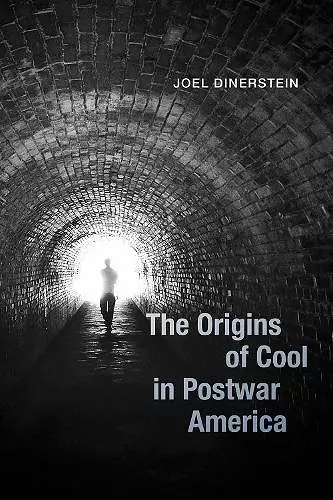The Origins of Cool in Postwar America
Format:Paperback
Publisher:The University of Chicago Press
Published:6th Aug '18
Currently unavailable, and unfortunately no date known when it will be back

Cool. It was a new word and a new way to be, and in a single generation, it became the supreme compliment of American culture. The Origins of Cool in Postwar America uncovers the hidden history of this concept and its new set of codes that came to define a global attitude and style. As Joel Dinerstein reveals in this dynamic book, cool began as a stylish defiance of racism, a challenge to suppressed sexuality, a philosophy of individual rebellion, and a youthful search for social change. Through eye-opening portraits of iconic figures, Dinerstein illuminates the cultural connections and artistic innovations among Lester Young, Humphrey Bogart, Robert Mitchum, Billie Holiday, Frank Sinatra, Jack Kerouac, Albert Camus, Marlon Brando, and James Dean, among others. We eavesdrop on conversations among Jean-Paul Sartre, Simone de Beauvoir, and Miles Davis, and on a forgotten debate between Lorraine Hansberry and Norman Mailer over the "white Negro" and black cool. We come to understand how the cool worlds of Beat writers and Method actors emerged from the intersections of film noir, jazz, and existentialism. Out of this mix, Dinerstein sketches nuanced definitions of cool that unite concepts from African-American and Euro-American culture: the stylish stoicism of the ethical rebel loner; the relaxed intensity of the improvising jazz musician; the effortless, physical grace of the Method actor. To be cool is not to be hip and to be hot is definitely not to be cool. This is the first work to trace the history of cool during the Cold War by exploring the intersections of film noir, jazz, existential literature, Method acting, blues, and rock and roll. Dinerstein reveals that they came together to create something completely new—and that something is cool.
"Dinerstein has written a thoughtful and entertaining account of cool--the most powerful image of how one should be since the English gentleman dominated the world. It's a history, a handbook, and a manual, filled with fascinating accounts of those stellar individuals whose aggressively haughty, patrician coldness was rooted in hip opposition and revolt."--John Szwed, author of Billie Holiday: The Musician and the Myth "Dinerstein takes seriously the roots of cool. Rather than some kind of irresponsible, juvenile put-on or species of ill-earned irony, cool is shown to be a game played for the highest of stakes--personal survival in the face of the era's unconcealed racism and barbarity that gave the lie to western civilization's moral self-congratulation."--Benjamin Cawthra, author of Blue Notes in Black and White: Photography and Jazz "These divisions, between white and black, Europe and America, individual and society, run through the history of cool and explain the different forms it takes and how these have evolved. . . . The history of post-war cool is both a history of these strange convergence--between French intellectuals, African American musicians and white working-class Hollywood heroes--and of the continuing conflicts between and within them. The real subject of Dinerstein's book is the debt that American culture owes to black art and style, and the way white America has responded to that debt."--Benjamin Markovits"Times Literary Supplement" (07/18/2017) "In his entertaining book, . . . Dinerstein shows that cool isn't just a style, it's an 'embodied philosophy' that is anchored in a specific generational circumstance. Cool was first of all a form of resistance and rebellion, a rejection of the innocence, optimism and consumer cheeriness that marked the mainstream postwar experience."--David Brooks "New York Times " "The Origins of Cool vibrates with the energy of its very subject--as restrained, composed, and revitalized as the postwar rebel himself. From the cafes of the existentialists to the bars of film noir, from Lester Young's sax to Elvis's pout, Dinerstein offers a brilliant exegesis of the simmering mode of resistance we call cool. He penetrates the meanings of a misunderstood mode--a concept, a mood, a posture--while connecting the rich details of art and culture to the deepest transformations of the postwar world. The Origins of Cool takes the elusive and inchoate and renders them clear and nearly tangible, making the reader feel this mysterious current of postwar culture as if for the first time. This is a masterwork."--Jefferson Cowie, author of Stayin' Alive: The 1970s and the Last Days of the Working Class "The Origins of Cool in Postwar America will be the standard reference for those who wish to understand the deep historical roots for coolness as a cultural style and ethos--a 'public mode of covert resistance, ' an expression of faith in the integrity and agency of the individual in the face of depression, war, occupation, segregation, and the threat of nuclear annihilation--rather than as a trendy pose or an emblem of hip consumerism. Dinerstein has achieved something like a unified field theory of the postwar American arts combined with a history of ideas attached to the quest for ethical renewal and existential affirmation."--John Gennari, author of Blowin' Hot and Cool: Jazz and Its Critics
ISBN: 9780226599069
Dimensions: 229mm x 152mm x 46mm
Weight: unknown
541 pages